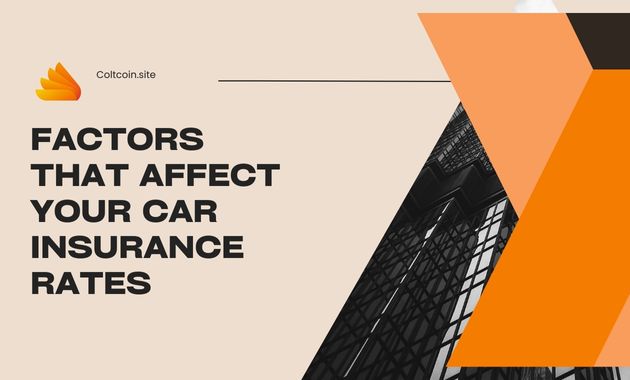Factors that affect your car insurance rates – Yo, you think your car insurance is just about how old your whip is? Think again! There are some seriously surprising factors that can make your premiums skyrocket, and they’re not what you might expect. From your credit score to your driving habits, there’s a whole lot more to it than you think.
It’s like, you know how you’re always trying to find the best deals? Well, the insurance game is the same. Understanding these factors can help you negotiate better rates and keep more cash in your pocket.
Your Driving History
Your driving history is a big deal when it comes to car insurance. Insurance companies use your driving record to figure out how risky you are as a driver. The cleaner your record, the lower your premiums are likely to be.
Driving Violations
Driving violations can really bump up your insurance rates. These are some common offenses that insurance companies take note of:
- Speeding Tickets: Getting caught speeding is a common violation. The faster you go, the higher the risk of an accident, and the more it will cost you in insurance.
- Reckless Driving: This is a serious offense that can lead to a hefty fine and a big jump in your insurance rates. Reckless driving includes things like street racing or driving dangerously.
- DUI/DWI: Driving under the influence of alcohol or drugs is a serious offense and a huge no-no. Insurance companies consider this extremely risky behavior, and your premiums will skyrocket if you’re caught.
- Traffic Violations: Even minor violations like running a red light or failing to stop at a stop sign can add up and impact your insurance.
Accidents
Even if you weren’t at fault, accidents can still make your insurance rates go up. Insurance companies see accidents as a sign that you’re more likely to be involved in another one. The more accidents you have, the higher your premiums will be.
Your Vehicle’s Features
Your car’s features can have a big impact on your insurance rates. Insurance companies consider things like safety features, vehicle make and model, and even how much your car is worth. They do this because these factors can affect how likely your car is to be involved in an accident, and how much it would cost to repair or replace it.
Safety Features
Safety features can significantly affect your insurance premiums. Insurance companies recognize that cars with advanced safety features are less likely to be involved in accidents, or that the severity of accidents might be reduced.
Yo, did you know your credit score can actually impact your car insurance rates? It’s one of those 5 surprising factors that can make your premiums go up or down. And just like you gotta be smart about your car insurance, you gotta be smart about your homeowners insurance too. Check out this guide on How to pick the best homeowners insurance for you so you can keep your crib protected.
Speaking of surprising factors, did you know your driving record isn’t the only thing that matters? Even your car’s safety features can affect your insurance rates.
- Anti-theft Systems: Cars with anti-theft systems, like alarms and immobilizers, are less likely to be stolen. This lowers the risk for insurance companies, which can translate into lower premiums for you.
- Airbags and Electronic Stability Control (ESC): These features help prevent accidents or reduce the severity of injuries if an accident does occur. Insurance companies often offer discounts for cars equipped with these features.
- Advanced Driver-Assistance Systems (ADAS): ADAS features like lane departure warning, adaptive cruise control, and automatic emergency braking can help drivers avoid accidents and are increasingly being recognized by insurance companies as a factor in determining rates.
Vehicle Make, Model, and Year
The make, model, and year of your car can also affect your insurance rates. This is because different vehicles have different safety ratings, repair costs, and theft risks.
Yo, you think your car insurance rates are just based on your driving record? Think again! There’s a whole bunch of wild stuff that impacts your premiums, like your credit score, the type of car you drive, and even your ZIP code. To get the lowdown on all the factors that affect your car insurance, check out A complete guide to understanding car insurance.
Once you know the deal, you can start strategizing how to keep those rates low and your ride insured.
- Safety Ratings: Cars with higher safety ratings from organizations like the Insurance Institute for Highway Safety (IIHS) or the National Highway Traffic Safety Administration (NHTSA) tend to have lower insurance premiums. These ratings are based on crash tests and other safety assessments.
- Repair Costs: Some car models are more expensive to repair than others. Insurance companies consider this factor when setting rates, as it impacts the cost of claims if an accident occurs.
- Theft Risk: Certain car models are more likely to be stolen than others. Insurance companies may charge higher premiums for these models to reflect the increased risk of theft claims.
Vehicle Value
The value of your car is another factor that can influence your insurance rates. This is because the cost of replacing or repairing a more expensive car is higher.
- Depreciation: As your car gets older, its value decreases. This depreciation can lead to lower insurance premiums, as the cost of replacing or repairing the car is less.
- Luxury Cars: Luxury cars tend to have higher insurance premiums due to their higher value and the cost of repairs.
Your Location and Driving Habits: 5 Surprising Factors That Affect Your Car Insurance Rates
Your location is a major factor in determining your car insurance rates. Insurance companies analyze data about the areas you live in and drive through to assess the risk of accidents and claims. They also consider the frequency of accidents, theft rates, and other factors. Your driving habits, like the distance you drive and your commuting patterns, also play a big role in your premiums.
The Impact of Your City or Neighborhood, 5 surprising factors that affect your car insurance rates
Your city or neighborhood can significantly affect your car insurance rates. Insurance companies use data to determine the risk of accidents in different areas.
- Higher-risk areas: Areas with high traffic, dense populations, and poor road conditions are more prone to accidents. This can lead to higher insurance premiums.
- Lower-risk areas: Areas with fewer cars, wider roads, and lower traffic density are generally considered lower risk. This can result in lower insurance premiums.
Driving Distance and Frequency
The distance you drive and how often you’re on the road can also impact your insurance rates.
Yo, did you know that things like your credit score and even your driving habits can seriously impact your car insurance rates? It’s like, totally wild, right? But it’s all about managing risk, which is why it’s super important to protect your home and finances with the right insurance, just like checking out this article on Protecting your home and finances with the right insurance.
Knowing these factors can help you keep your insurance premiums in check and avoid any unexpected surprises.
- Driving more: The more you drive, the higher the chance of being involved in an accident. Insurance companies consider this when calculating your premiums.
- Driving less: If you drive less frequently, you’re less likely to be in an accident, which can lead to lower premiums.
Commuting Patterns
Your daily commute can also affect your insurance rates.
- High-traffic commutes: Driving in heavy traffic increases your risk of accidents. Insurance companies might charge higher premiums for people with long commutes in high-traffic areas.
- Short commutes: If you have a short commute, you’re less likely to be involved in an accident. This can lead to lower insurance premiums.
Your Credit Score
You might be thinking, “What does my credit score have to do with my car insurance?” Well, it turns out there’s a surprising connection. Insurance companies are starting to use your credit history to assess your risk as a driver. It might sound a little crazy, but it’s based on the idea that people who manage their finances responsibly are also more likely to be responsible drivers.
How a Good Credit Score Can Lead to Lower Insurance Rates
Think of it this way: insurance companies want to make sure they’re only insuring people who are likely to drive safely and not file a bunch of claims. So, they look for clues about your financial responsibility, and your credit score is one of those clues. A good credit score shows that you’re reliable and can handle your finances, which can make insurance companies more confident in insuring you.
This can lead to lower premiums, which means you’ll pay less for your car insurance.
A good credit score can help you save money on your car insurance.
How Insurance Companies Use Credit Information to Assess Risk
Insurance companies use a complex system to analyze your credit score and other factors to determine your insurance rate. They don’t just look at your credit score in isolation, but they consider it alongside other information like your driving history, age, and the type of car you drive. They’re basically trying to build a picture of you as a driver based on all the information they have.
Here’s how it works:
- Credit Score: This is a number that represents your creditworthiness. A higher score means you’re more likely to pay your bills on time, which is seen as a sign of financial responsibility.
- Driving History: This includes things like speeding tickets, accidents, and other violations.
- Age: Younger drivers are statistically more likely to get into accidents, so they usually pay higher premiums.
- Type of Car: Some cars are more expensive to repair or replace, which can affect your insurance rates.
Your Insurance Coverage and Deductible
You’ve probably heard about comprehensive and collision coverage, but do you know how they affect your car insurance premiums? Choosing the right coverage and deductible can significantly impact your monthly payments. So, let’s dive into the details and see how you can find the sweet spot between protection and affordability.
The Impact of Coverage
Your insurance coverage directly influences your premiums. Comprehensive coverage protects you against damages caused by events like theft, vandalism, and natural disasters. Collision coverage, on the other hand, covers damages from accidents, regardless of who’s at fault.
Choosing comprehensive and collision coverage usually leads to higher premiums compared to having only liability coverage, which is the minimum required by law.
However, if you have a newer or more expensive car, these coverages can be crucial. They offer peace of mind knowing that you’re protected in case of unforeseen events.
So, next time you’re filling out that insurance application, don’t just think about your car. Think about your credit score, your driving history, and even where you park your ride. Knowing the factors that affect your premiums can save you some serious dough in the long run. And trust me, that extra cash can go towards some pretty awesome things, like that sweet new sound system you’ve been eyeing.




